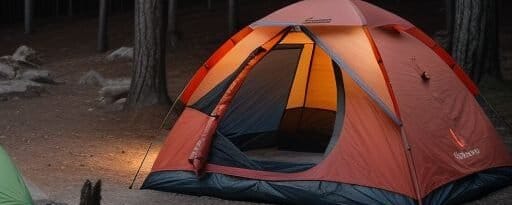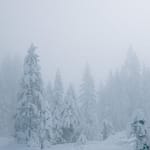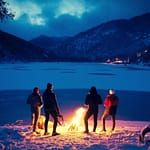Living in an RV in Winter
Are you ready to take the plunge and live in an RV during the winter? Before you hit the road, make sure you are well-prepared for colder temperatures and harsh weather conditions. In this blog post, we’ll provide tips and advice on how to prepare your RV for winter living.
Choose a Location Wisely
When winter RVing, it is important to choose a location wisely. Generally, you will want to find a spot that is sheltered from the elements and has easy access to propane, electricity, and water. Also, it is important to find a location that can accommodate your rig size and has enough space for maneuvering. Make sure to check for any potential dangers or hazards in the area, such as fallen trees or flooding. By doing your research ahead of time, you can make sure that you have chosen a safe spot for RVing in the winter.
Prepare Your RV for Winter
When living in an RV during the winter, there are certain preparations that need to be made in order to ensure a safe and comfortable experience. Start by filling your fresh water tank and/or using a heated water hose. Make sure to have a spare propane tank filled and ready to go. Invest in heaters and space heaters to help keep the interior warm. Make sure all windows and doors are insulated to prevent any heat from escaping. Pay attention to the sewer hookups and make sure they are adequate for your needs. Install electric heating pads around your water supply system to prevent pipes from freezing and bursting. Upgrade your insulation to protect many of the vehicle components from damage, and keep fuel tanks full. Lastly, store your RV correctly for winter and address any electrical system concerns that may arise. With these tips and precautions, you can safely live in your RV during the winter months.
Insulate Your Windows and Doors
Winter RV living requires some extra preparation, especially when it comes to insulating your windows and doors. Insulation is key to keeping the warmth inside your RV and preventing cold drafts from coming in. For windows, use heavy curtains or thermal-lined drapes. You can also add extra insulation to your windows with shrink-film window kits. For doors, make sure to use weatherstripping around the frames and install door sweeps to keep out drafts. If you’re unable to buy window and door insulation, you can use foam pipe insulation for a more makeshift solution. Taking the time to insulate your windows and doors will make a world of difference in how warm and comfortable you are during winter RV living.
Invest in Heaters and Space Heaters
Winter RV living can be a challenge, especially in cold climates. To help you stay warm and cozy inside your RV, it’s important to invest in quality heaters and space heaters. Heaters come in a variety of sizes and styles, so you can find one that fits your RV perfectly. When shopping for a heater, make sure it’s rated for the size of your RV and the type of fuel you plan to use. Additionally, space heaters offer additional warmth by providing targeted heat in small spaces. Make sure you choose a space heater that is safe to use inside your RV and is the correct size for the area you plan to heat. Finally, don’t forget to purchase extra fuel and/or batteries to ensure your heating system continues to work even when the power goes out.
Make Sure You Have Adequate Sewer Hookups
Living in an RV during winter can be a challenge, especially if you don’t have the proper sewer hookups. Having a good sewer hookup is essential to ensure that your waste is properly disposed of and you don’t experience any plumbing issues. Make sure that your RV is connected to a sewer system with a direct connection or a tank. You can also opt for an RV waste tank which is designed to be emptied on a regular basis. Additionally, it’s important to check your hose connections and clamps to make sure everything is secure before winter sets in.
Protect Plumbing Pipes
Protecting your plumbing pipes is essential for a successful winter RV experience. To prevent freezing, you can use special electric heating pads and hook them up to the RV’s water supply system. Additionally, you can use heat tape or pipe insulation to keep pipes from freezing. Make sure to properly seal any openings to the outside and ensure that any areas with exposed piping are adequately insulated. Doing these steps will help protect your plumbing system from damage and ensure that you have a warm and comfortable living space.
Keep Fuel Tanks Full
If you plan to stay in your RV during the winter, it is essential that you keep your fuel tanks full. Not only will this ensure that you have enough fuel to run your generator, but it will also prevent the fuel from freezing and damaging your RV. Keeping your fuel tanks full for winter RVing is a must for any long-term camping trip, so make sure to fill up before heading out! Additionally, if you plan to be in areas with colder temperatures, consider investing in fuel additives that can help protect against freezing.
Store Your RV Correctly
When preparing to store your RV for the winter, it is important to keep it somewhere dry and sheltered. Be sure to cover your RV with a tarp or other covering material that is both waterproof and breathable. This will help protect your vehicle from the elements and keep it from accumulating moisture. If you are storing your RV outside, make sure to prop up the wheels so that the tires do not sink into the ground. Additionally, it is a good idea to apply a protective wax coating to the exterior of your RV to prevent rust and corrosion. Finally, be sure to disconnect the battery and drain all of the tanks in order to avoid any damage due to freezing temperatures. By taking these simple steps, you can rest easy knowing that your RV is safe and secure over the winter months.
Address Electrical System Concerns
Winter is a time of extreme temperatures, and your RV’s electrical system needs to be up to the challenge. To make sure that your RV’s electrical system is functioning properly, you should check all the batteries and replace them if needed. Additionally, you should inspect all the wiring, making sure that it is insulated and protected from moisture. If you have any doubts about any of the components of your RV’s electrical system, it’s best to have it checked by a professional who can accurately diagnose and repair any potential issues. Additionally, investing in a generator for backup power is also a wise choice for winter RV living, as it can provide you with extra power when needed.
Install a Generator for Backup Power
When living in an RV during winter, it is important to ensure you have a reliable source of backup power in case of a power outage. A generator can be a great asset to have and can help keep your RV warm and safe while you wait for the power to be restored. Generators come in a variety of sizes and styles, so make sure to select one that best meets your needs. Be sure to also read your RV manual to make sure that the generator you select is compatible with your RV and check with a professional if you have any questions. Additionally, be sure to follow any safety and operating instructions that come with the generator.








